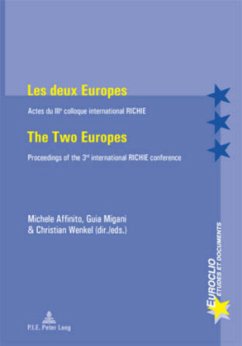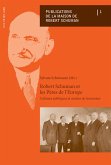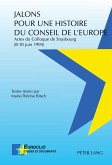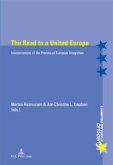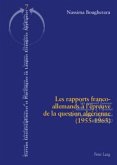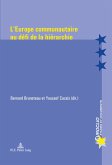Les deux Europes - The Two Europes
Actes du IIIe colloque international RICHIE - Proceedings of the 3rd international RICHIE conference
Herausgegeben:Affinito, Michele; Migani, Guia; Wenkel, Christian
Les deux Europes - The Two Europes
Actes du IIIe colloque international RICHIE - Proceedings of the 3rd international RICHIE conference
Herausgegeben:Affinito, Michele; Migani, Guia; Wenkel, Christian
- Broschiertes Buch
- Merkliste
- Auf die Merkliste
- Bewerten Bewerten
- Teilen
- Produkt teilen
- Produkterinnerung
- Produkterinnerung
L'histoire de l'Europe au XX e siècle est marquée par de nombreux dualismes dont les traces continuent à caractériser l'Union européenne. Pour mieux comprendre les problèmes actuels de l'intégration européenne, ces dualismes sont étudiés dans une perspective historique et déclinés en quatre axes de réflexion : Europe de l'Est versus Europe de l'Ouest, Europe comme rêve versus Europe comme réalité, Europe(s) politique(s) versus Europe(s) économique(s) et Europe puissance versus Europe comme instrument de puissance. Le présent ouvrage recueille les actes du III e colloque international de…mehr
Andere Kunden interessierten sich auch für
![Robert Schuman et les Pères de l¿Europe Robert Schuman et les Pères de l¿Europe]() Robert Schuman et les Pères de l¿Europe55,95 €
Robert Schuman et les Pères de l¿Europe55,95 €![Les archives dans l¿université Les archives dans l¿université]() Les archives dans l¿université84,25 €
Les archives dans l¿université84,25 €![Jalons pour une histoire du Conseil de l'Europe Jalons pour une histoire du Conseil de l'Europe]() Jalons pour une histoire du Conseil de l'Europe92,95 €
Jalons pour une histoire du Conseil de l'Europe92,95 €![De la cité au campus De la cité au campus]() De la cité au campus49,00 €
De la cité au campus49,00 €![The Road to a United Europe The Road to a United Europe]() The Road to a United Europe51,99 €
The Road to a United Europe51,99 €![Les rapports franco-allemands à l'épreuve de la question algérienne (1955-1963) Les rapports franco-allemands à l'épreuve de la question algérienne (1955-1963)]() Nassima BougheraraLes rapports franco-allemands à l'épreuve de la question algérienne (1955-1963)106,90 €
Nassima BougheraraLes rapports franco-allemands à l'épreuve de la question algérienne (1955-1963)106,90 €![L¿Europe communautaire au défi de la hiérarchie L¿Europe communautaire au défi de la hiérarchie]() L¿Europe communautaire au défi de la hiérarchie46,50 €
L¿Europe communautaire au défi de la hiérarchie46,50 €-
-
-
L'histoire de l'Europe au XX e siècle est marquée par de nombreux dualismes dont les traces continuent à caractériser l'Union européenne. Pour mieux comprendre les problèmes actuels de l'intégration européenne, ces dualismes sont étudiés dans une perspective historique et déclinés en quatre axes de réflexion : Europe de l'Est versus Europe de l'Ouest, Europe comme rêve versus Europe comme réalité, Europe(s) politique(s) versus Europe(s) économique(s) et Europe puissance versus Europe comme instrument de puissance.
Le présent ouvrage recueille les actes du III e colloque international de l'association RICHIE (Réseau international de jeunes chercheurs en histoire de l'intégration européenne) qui s'est tenu à Naples (Italie) en décembre 2007 et qui a réuni une vingtaine de jeunes chercheurs de toute l'Europe pour présenter l'état de leurs travaux en cours à travers cette perspective.
The history of Europe in the 20 th century is marked by several dualisms, traces of which continue to characterize the European Union. For a better understanding of the current problems of European integration, these dualisms should be studied in their historical context. This book is organized around four axes: Eastern Europe versus Western Europe, Europe as a dream versus Europe as a reality, Political Europe(s) versus Economic Europe(s), Europe as a power versus Europe as an instrument of power.
The present work gathers the proceedings of the 3 rd international conference of the RICHIE association (International Network of Young Researchers in European Integration History). The conference took place in Naples (Italy) in December 2007, and brought together young scholars from all over Europe to present their current research on this topic.
Le présent ouvrage recueille les actes du III e colloque international de l'association RICHIE (Réseau international de jeunes chercheurs en histoire de l'intégration européenne) qui s'est tenu à Naples (Italie) en décembre 2007 et qui a réuni une vingtaine de jeunes chercheurs de toute l'Europe pour présenter l'état de leurs travaux en cours à travers cette perspective.
The history of Europe in the 20 th century is marked by several dualisms, traces of which continue to characterize the European Union. For a better understanding of the current problems of European integration, these dualisms should be studied in their historical context. This book is organized around four axes: Eastern Europe versus Western Europe, Europe as a dream versus Europe as a reality, Political Europe(s) versus Economic Europe(s), Europe as a power versus Europe as an instrument of power.
The present work gathers the proceedings of the 3 rd international conference of the RICHIE association (International Network of Young Researchers in European Integration History). The conference took place in Naples (Italy) in December 2007, and brought together young scholars from all over Europe to present their current research on this topic.
Produktdetails
- Produktdetails
- Euroclio 46
- Verlag: Peter Lang
- Artikelnr. des Verlages: 21481
- Seitenzahl: 359
- Englisch, Französisch
- Abmessung: 19mm x 150mm x 220mm
- Gewicht: 510g
- ISBN-13: 9789052014814
- ISBN-10: 9052014817
- Artikelnr.: 27780687
- Herstellerkennzeichnung Die Herstellerinformationen sind derzeit nicht verfügbar.
- Euroclio 46
- Verlag: Peter Lang
- Artikelnr. des Verlages: 21481
- Seitenzahl: 359
- Englisch, Französisch
- Abmessung: 19mm x 150mm x 220mm
- Gewicht: 510g
- ISBN-13: 9789052014814
- ISBN-10: 9052014817
- Artikelnr.: 27780687
- Herstellerkennzeichnung Die Herstellerinformationen sind derzeit nicht verfügbar.
Contenu/Contents: Piero Craveri/Antonio Varsori: Foreword - Michele Affinito/Guia Migani/Christian Wenkel : Introduction - Anikó Macher : Le Groupe de travail des échanges Est-Ouest. Acteur ou simple observatoire occidental des relations culturelles entre les deux Europes (1960-1966) ? - Lucia Coppolaro: Trade, Security and the Two Europes. The Accession of the Socialist Countries to GATT (1959-1973) - Valentine Lomellini: The Two Europes: Continuity and Breaks. 1968 and 1981, Eastern Crisis, Italian Outcomes - Karolina Pietras : L'Europe de l'Ouest face aux tensions dans le bloc communiste. La crise polonaise des années 1980 - Maria Coros : L'image de l'Europe occidentale dans les manuels scolaires roumains d'histoire et de géographie pendant le régime de Ceausescu (1965-1989) - Christian Domnitz: A Re-Emergence of the Other Europe? The Framing of Europe in the Eastern Bloc Makes up a Demanding Legacy for EU Integration - Carol Bergami : L'Europe est ailleurs ! Technique européenne et politique nationale chez Francis Delaisi et Jean Monnet - Mauve Carbonell: Victors and Vainquished of WWII. Europe in Common? The Members of the High Authority of the ECSC - Maria Elena Cavallaro: The Spanish European Integration. The First Steps of a Long Journey (1975-1979) - Matthieu Trouvé : De l'enthousiasme à la banalisation. L'opinion publique espagnole et l'Europe (1975-2005) - Morgane Le Boulay : « L'unité dans la diversité ». L'Europe comme nouvelle figure des tensions de la communauté historienne autour de sa fonction politique - Matthieu Osmont : Europe politique versus Europe économique ? Rivalités et répartition des rôles dans les dossiers européens entre la direction des Affaires politiques et la direction des Affaires économiques et financières au Quai d'Orsay (1955-1974) - Emmanuel Mourlon-Druol: Economist or Monetarist? The Difficult Creation of an Internal French Consensus about European Monetary Integration (1974-1976) - Marloes C. Beers: The Dichotomy of Large and Small States in the European Communities. A Challenge for Historians - Gabriele D'Ottavio: The Federal Republic of Germany and the Dichotomy between Political and Economic Europe. From the Treaties of Rome to Maastricht - Federico Niglia: The Power of Prejudice. Italian anti-Germanism from the Postwar Period up to the Present Day - Jenny Raflik : L'Europe en quête de puissance. La France entre européisme et atlantisme depuis 1945 - Giulia Bentivoglio: Britain, the EEC and the Special Relationship during the Heath Government - Mauro Elli: The UK Role in the European Community. EEC Energy Policy at the Eve of the Oil Crisis - Thomas Derungs: The Integration of a Different Europe. The European Community's Enlargement to the South and the Evolving Concept of a Civilian Power - Sara Banchi: Intergovernmental Confrontation in the UN Framework. How Many «Europes»?Contenu/Contents: Piero Craveri/Antonio Varsori: Foreword - Michele Affinito/Guia Migani/Christian Wenkel : Introduction - Anikó Macher : Le Groupe de travail des échanges Est-Ouest . Acteur ou simple observatoire occidental des relations culturelles entre les deux Europes (1960-1966) ? - Lucia Coppolaro: Trade, Security and the Two Europes . The Accession of the Socialist Countries to GATT (1959-1973) - Valentine Lomellini: The Two Europes: Continuity and Breaks. 1968 and 1981, Eastern Crisis, Italian Outcomes - Karolina Pietras : L'Europe de l'Ouest face aux tensions dans le bloc communiste. La crise polonaise des années 1980 - Maria Coros : L'image de l'Europe occidentale dans les manuels scolaires roumains d'histoire et de géographie pendant le régime de Ceausescu (1965-1989) - Christian Domnitz: A Re-Emergence of the Other Europe? The Framing of Europe in the Eastern Bloc Makes up a Demanding Legacy for EU Integration - Carol Bergami : L'Europe est ailleurs ! Technique européenne et politique nationale chez Francis Delaisi et Jean Monnet - Mauve Carbonell: Victors and Vainquished of WWII. Europe in Common? The Members of the High Authority of the ECSC - Maria Elena Cavallaro: The Spanish European Integration. The First Steps of a Long Journey (1975-1979) - Matthieu Trouvé : De l'enthousiasme à la banalisation. L'opinion publique espagnole et l'Europe (1975-2005) - Morgane Le Boulay : " L'unité dans la diversité ". L'Europe comme nouvelle figure des tensions de la communauté historienne autour de sa fonction politique - Matthieu Osmont : Europe politique versus Europe économique ? Rivalités et répartition des rôles dans les dossiers européens entre la direction des Affaires politiques et la direction des Affaires économiques et financières au Quai d'Orsay (1955-1974) - Emmanuel Mourlon-Druol: Economist or Monetarist? The Difficult Creation of an Internal French Consensus about European Monetary Integration (1974-1976) - Marloes C. Beers: The Dichotomy of Large and Small States in the European Communities. A Challenge for Historians - Gabriele D'Ottavio: The Federal Republic of Germany and the Dichotomy between Political and Economic Europe. From the Treaties of Rome to Maastricht - Federico Niglia: The Power of Prejudice. Italian anti-Germanism from the Postwar Period up to the Present Day - Jenny Raflik : L'Europe en quête de puissance. La France entre européisme et atlantisme depuis 1945 - Giulia Bentivoglio: Britain, the EEC and the Special Relationship during the Heath Government - Mauro Elli: The UK Role in the European Community. EEC Energy Policy at the Eve of the Oil Crisis - Thomas Derungs: The Integration of a Different Europe. The European Community's Enlargement to the South and the Evolving Concept of a Civilian Power - Sara Banchi: Intergovernmental Confrontation in the UN Framework. How Many "Europes"?
Contenu/Contents: Piero Craveri/Antonio Varsori: Foreword - Michele Affinito/Guia Migani/Christian Wenkel : Introduction - Anikó Macher : Le Groupe de travail des échanges Est-Ouest. Acteur ou simple observatoire occidental des relations culturelles entre les deux Europes (1960-1966) ? - Lucia Coppolaro: Trade, Security and the Two Europes. The Accession of the Socialist Countries to GATT (1959-1973) - Valentine Lomellini: The Two Europes: Continuity and Breaks. 1968 and 1981, Eastern Crisis, Italian Outcomes - Karolina Pietras : L'Europe de l'Ouest face aux tensions dans le bloc communiste. La crise polonaise des années 1980 - Maria Coros : L'image de l'Europe occidentale dans les manuels scolaires roumains d'histoire et de géographie pendant le régime de Ceausescu (1965-1989) - Christian Domnitz: A Re-Emergence of the Other Europe? The Framing of Europe in the Eastern Bloc Makes up a Demanding Legacy for EU Integration - Carol Bergami : L'Europe est ailleurs ! Technique européenne et politique nationale chez Francis Delaisi et Jean Monnet - Mauve Carbonell: Victors and Vainquished of WWII. Europe in Common? The Members of the High Authority of the ECSC - Maria Elena Cavallaro: The Spanish European Integration. The First Steps of a Long Journey (1975-1979) - Matthieu Trouvé : De l'enthousiasme à la banalisation. L'opinion publique espagnole et l'Europe (1975-2005) - Morgane Le Boulay : « L'unité dans la diversité ». L'Europe comme nouvelle figure des tensions de la communauté historienne autour de sa fonction politique - Matthieu Osmont : Europe politique versus Europe économique ? Rivalités et répartition des rôles dans les dossiers européens entre la direction des Affaires politiques et la direction des Affaires économiques et financières au Quai d'Orsay (1955-1974) - Emmanuel Mourlon-Druol: Economist or Monetarist? The Difficult Creation of an Internal French Consensus about European Monetary Integration (1974-1976) - Marloes C. Beers: The Dichotomy of Large and Small States in the European Communities. A Challenge for Historians - Gabriele D'Ottavio: The Federal Republic of Germany and the Dichotomy between Political and Economic Europe. From the Treaties of Rome to Maastricht - Federico Niglia: The Power of Prejudice. Italian anti-Germanism from the Postwar Period up to the Present Day - Jenny Raflik : L'Europe en quête de puissance. La France entre européisme et atlantisme depuis 1945 - Giulia Bentivoglio: Britain, the EEC and the Special Relationship during the Heath Government - Mauro Elli: The UK Role in the European Community. EEC Energy Policy at the Eve of the Oil Crisis - Thomas Derungs: The Integration of a Different Europe. The European Community's Enlargement to the South and the Evolving Concept of a Civilian Power - Sara Banchi: Intergovernmental Confrontation in the UN Framework. How Many «Europes»?Contenu/Contents: Piero Craveri/Antonio Varsori: Foreword - Michele Affinito/Guia Migani/Christian Wenkel : Introduction - Anikó Macher : Le Groupe de travail des échanges Est-Ouest . Acteur ou simple observatoire occidental des relations culturelles entre les deux Europes (1960-1966) ? - Lucia Coppolaro: Trade, Security and the Two Europes . The Accession of the Socialist Countries to GATT (1959-1973) - Valentine Lomellini: The Two Europes: Continuity and Breaks. 1968 and 1981, Eastern Crisis, Italian Outcomes - Karolina Pietras : L'Europe de l'Ouest face aux tensions dans le bloc communiste. La crise polonaise des années 1980 - Maria Coros : L'image de l'Europe occidentale dans les manuels scolaires roumains d'histoire et de géographie pendant le régime de Ceausescu (1965-1989) - Christian Domnitz: A Re-Emergence of the Other Europe? The Framing of Europe in the Eastern Bloc Makes up a Demanding Legacy for EU Integration - Carol Bergami : L'Europe est ailleurs ! Technique européenne et politique nationale chez Francis Delaisi et Jean Monnet - Mauve Carbonell: Victors and Vainquished of WWII. Europe in Common? The Members of the High Authority of the ECSC - Maria Elena Cavallaro: The Spanish European Integration. The First Steps of a Long Journey (1975-1979) - Matthieu Trouvé : De l'enthousiasme à la banalisation. L'opinion publique espagnole et l'Europe (1975-2005) - Morgane Le Boulay : " L'unité dans la diversité ". L'Europe comme nouvelle figure des tensions de la communauté historienne autour de sa fonction politique - Matthieu Osmont : Europe politique versus Europe économique ? Rivalités et répartition des rôles dans les dossiers européens entre la direction des Affaires politiques et la direction des Affaires économiques et financières au Quai d'Orsay (1955-1974) - Emmanuel Mourlon-Druol: Economist or Monetarist? The Difficult Creation of an Internal French Consensus about European Monetary Integration (1974-1976) - Marloes C. Beers: The Dichotomy of Large and Small States in the European Communities. A Challenge for Historians - Gabriele D'Ottavio: The Federal Republic of Germany and the Dichotomy between Political and Economic Europe. From the Treaties of Rome to Maastricht - Federico Niglia: The Power of Prejudice. Italian anti-Germanism from the Postwar Period up to the Present Day - Jenny Raflik : L'Europe en quête de puissance. La France entre européisme et atlantisme depuis 1945 - Giulia Bentivoglio: Britain, the EEC and the Special Relationship during the Heath Government - Mauro Elli: The UK Role in the European Community. EEC Energy Policy at the Eve of the Oil Crisis - Thomas Derungs: The Integration of a Different Europe. The European Community's Enlargement to the South and the Evolving Concept of a Civilian Power - Sara Banchi: Intergovernmental Confrontation in the UN Framework. How Many "Europes"?

